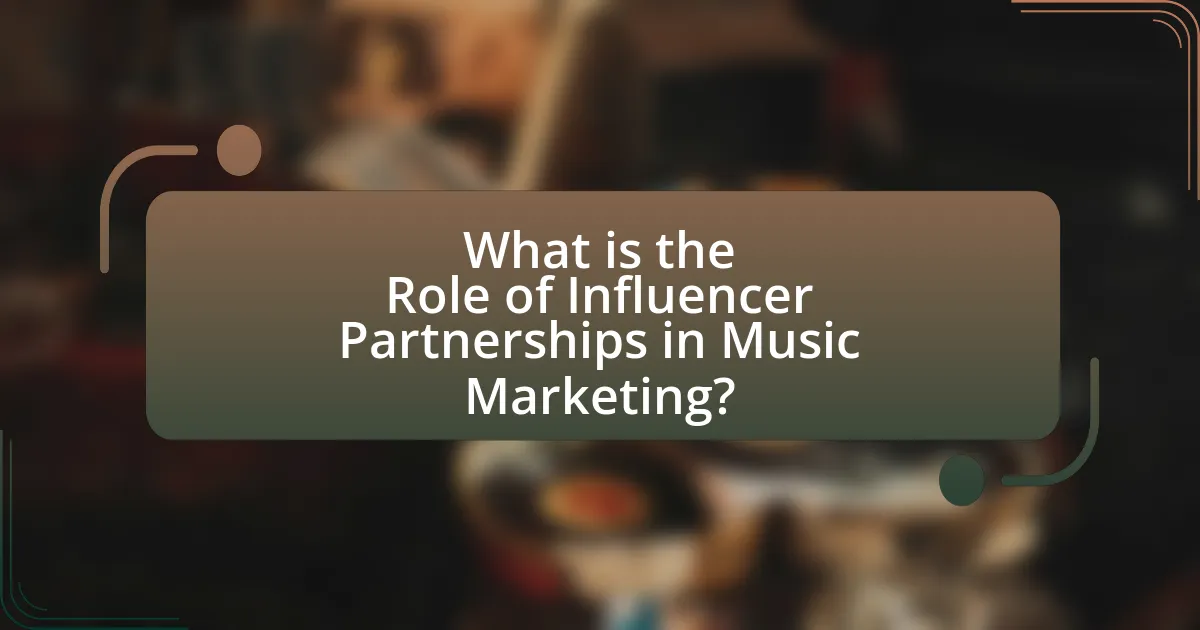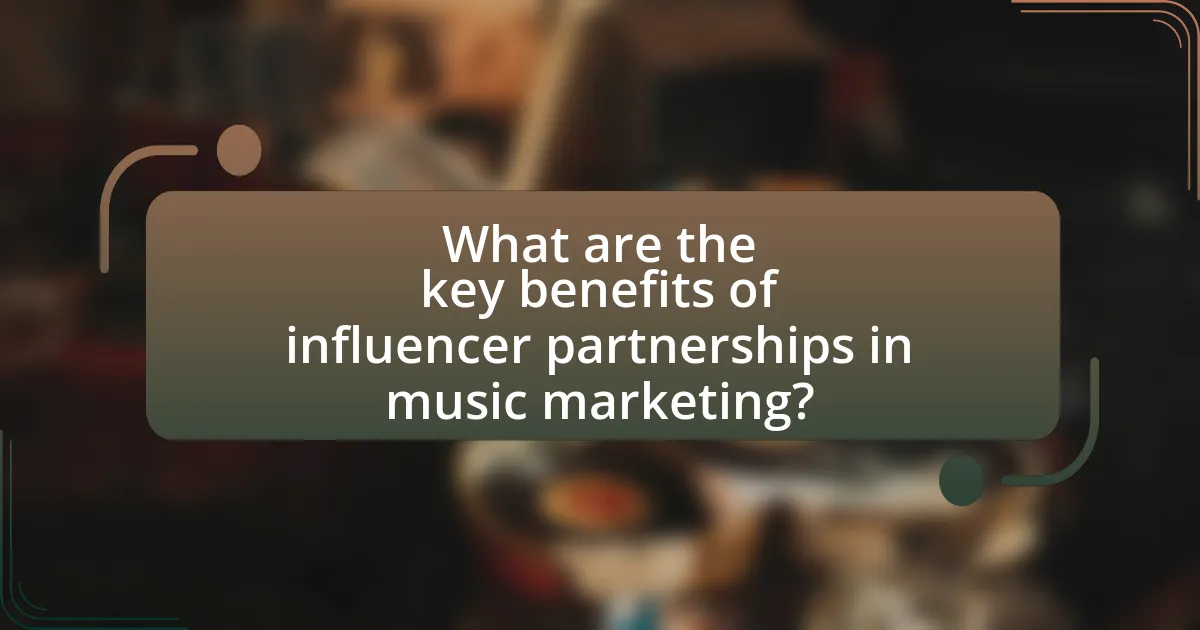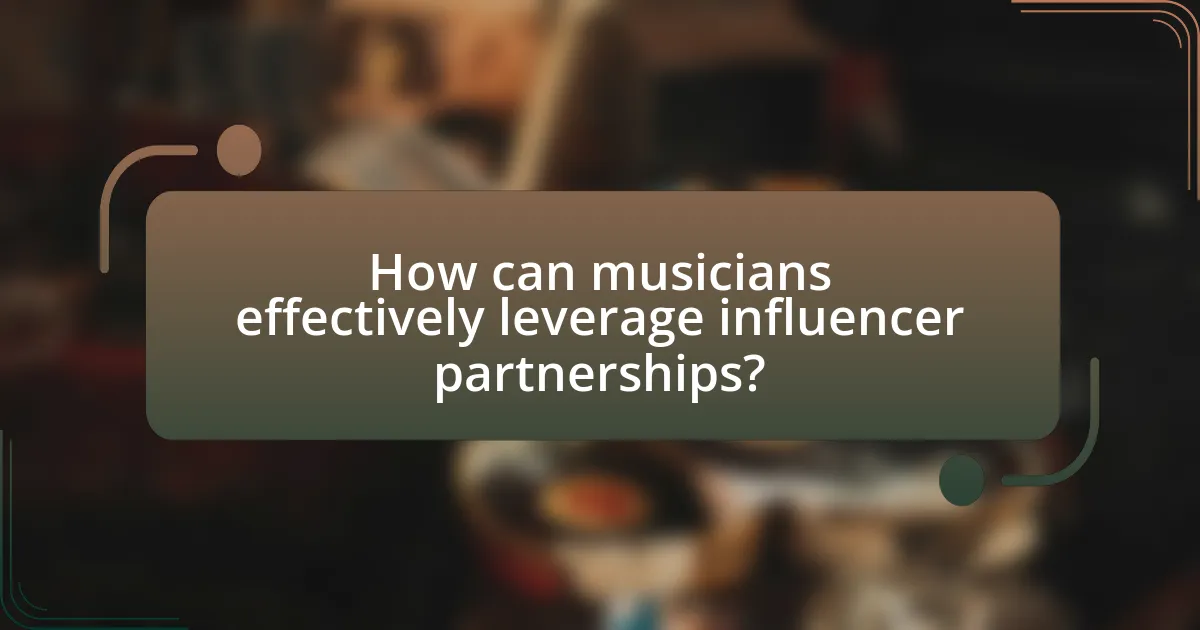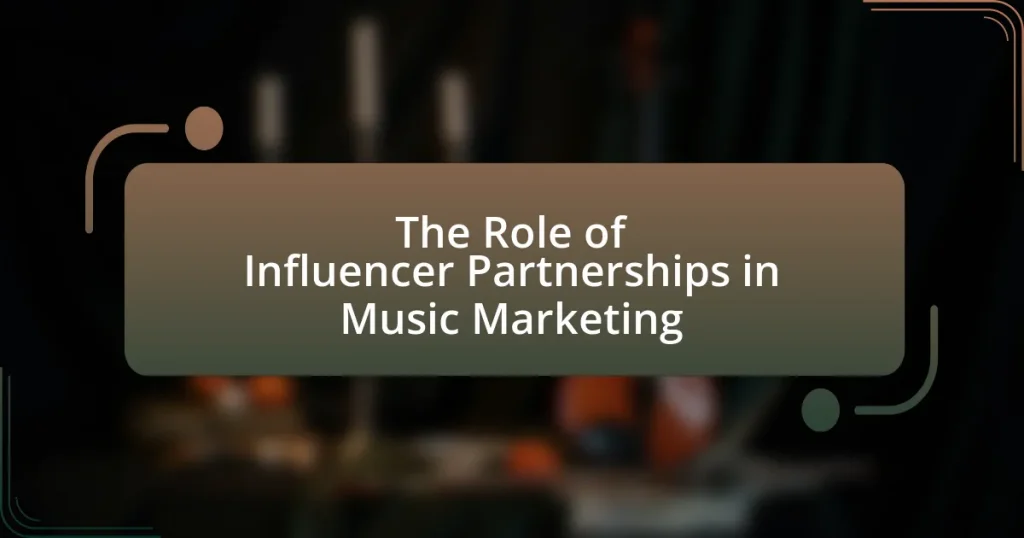The article focuses on the significant role of influencer partnerships in music marketing, highlighting how these collaborations enhance visibility and engagement for artists. It discusses the effectiveness of influencer endorsements, particularly through platforms like Instagram and TikTok, which can lead to increased streaming numbers and social media interactions. The article also examines the types of influencers that are most effective, such as micro-influencers and music influencers, and outlines strategies for musicians to identify and collaborate with the right influencers. Additionally, it addresses the benefits of influencer partnerships, including increased brand awareness and audience engagement, while providing practical tips for maximizing the impact of these collaborations.

What is the Role of Influencer Partnerships in Music Marketing?
Influencer partnerships play a crucial role in music marketing by enhancing visibility and engagement for artists. These collaborations leverage the influencer’s established audience, allowing musicians to reach potential fans more effectively. For instance, a study by Nielsen found that 92% of consumers trust recommendations from individuals over brands, highlighting the effectiveness of influencer endorsements. Additionally, platforms like Instagram and TikTok have shown that music promoted by influencers can lead to significant increases in streaming numbers and social media interactions, demonstrating the tangible impact of these partnerships on an artist’s success.
How do influencer partnerships impact music marketing strategies?
Influencer partnerships significantly enhance music marketing strategies by leveraging the influencer’s reach and credibility to engage target audiences effectively. These collaborations allow artists and labels to tap into the influencer’s established fan base, which can lead to increased visibility and engagement for new music releases. For instance, a study by Nielsen found that 92% of consumers trust recommendations from individuals over brands, highlighting the effectiveness of influencer endorsements in driving consumer behavior. Additionally, platforms like Instagram and TikTok have shown that music promoted through influencers often experiences higher streaming numbers and social media interactions, demonstrating a direct correlation between influencer partnerships and successful music marketing outcomes.
What types of influencers are most effective in music marketing?
Micro-influencers and music influencers are the most effective types of influencers in music marketing. Micro-influencers, typically having between 1,000 to 100,000 followers, often boast higher engagement rates and more authentic connections with their audience, leading to increased trust and conversion rates. Music influencers, who specialize in music-related content, have established credibility and a dedicated following, making them ideal for promoting new releases and events. According to a study by Influencer Marketing Hub, campaigns involving micro-influencers can yield up to 60% higher engagement compared to those with larger influencers, demonstrating their effectiveness in reaching targeted music audiences.
How do influencers enhance audience engagement in music marketing?
Influencers enhance audience engagement in music marketing by leveraging their established trust and connection with followers to promote music content. This relationship allows influencers to create authentic interactions, encouraging their audience to explore new music and artists. For instance, a study by the Digital Marketing Institute found that 49% of consumers depend on influencer recommendations when making purchasing decisions, highlighting the effectiveness of influencers in driving engagement. Additionally, influencers often utilize platforms like Instagram and TikTok to share music-related content, which can lead to increased visibility and interaction rates, further solidifying their role in enhancing audience engagement in the music industry.
Why are influencer partnerships becoming essential in the music industry?
Influencer partnerships are becoming essential in the music industry because they significantly enhance audience reach and engagement. Influencers possess established trust and credibility with their followers, which allows music artists to tap into new demographics and promote their work more effectively. For instance, a study by Nielsen found that 92% of consumers trust recommendations from individuals over brands, highlighting the effectiveness of influencer marketing. Additionally, platforms like Instagram and TikTok have shown that music promoted through influencers can lead to viral trends, as seen with songs like “Old Town Road” by Lil Nas X, which gained traction through social media influencers. This synergy between influencers and musicians creates a powerful marketing strategy that drives both visibility and sales.
What trends are driving the rise of influencer partnerships in music marketing?
The rise of influencer partnerships in music marketing is primarily driven by the increasing importance of social media platforms in audience engagement. As artists and labels recognize that over 50% of music discovery now occurs through social media channels, they leverage influencers to reach targeted demographics effectively. Influencers possess established trust and credibility with their followers, making them valuable for promoting music releases and events. Additionally, the shift towards authentic content consumption has led brands to prioritize partnerships with influencers who can create relatable and engaging narratives around music, further enhancing visibility and fan connection.
How do influencer partnerships compare to traditional marketing methods in music?
Influencer partnerships in music marketing are generally more effective than traditional marketing methods due to their ability to engage targeted audiences authentically. Influencers often have established trust and rapport with their followers, which can lead to higher engagement rates and conversion compared to traditional methods like radio ads or billboards, which may not reach specific demographics as effectively. For instance, a study by the Digital Marketing Institute found that influencer marketing can yield an ROI of up to 11 times higher than traditional advertising. This demonstrates that influencer partnerships not only enhance visibility but also foster a deeper connection with potential listeners, making them a powerful tool in modern music marketing strategies.

What are the key benefits of influencer partnerships in music marketing?
Influencer partnerships in music marketing provide significant benefits, including enhanced reach, targeted audience engagement, and increased credibility. These partnerships allow artists to tap into the influencer’s established follower base, which can lead to a broader audience exposure. For instance, a study by Nielsen found that 92% of consumers trust recommendations from individuals over brands, highlighting the effectiveness of influencers in building trust and authenticity around music releases. Additionally, influencers often have a specific niche, enabling artists to connect with targeted demographics that align with their music style, thereby increasing the likelihood of fan conversion.
How do influencer partnerships increase brand awareness for musicians?
Influencer partnerships increase brand awareness for musicians by leveraging the influencer’s established audience to promote the musician’s work. When influencers share music, videos, or concert information with their followers, they tap into a pre-existing community that trusts their recommendations. For instance, a study by Nielsen found that 92% of consumers trust recommendations from individuals over brands, highlighting the effectiveness of influencer marketing. Additionally, musicians can gain exposure to diverse demographics through influencers, expanding their reach beyond traditional marketing channels. This strategy not only enhances visibility but also fosters a sense of authenticity, as fans often perceive influencer endorsements as more genuine compared to conventional advertisements.
What metrics can be used to measure brand awareness through influencer partnerships?
Metrics to measure brand awareness through influencer partnerships include reach, impressions, engagement rate, and brand recall. Reach quantifies the total number of unique users exposed to the content, while impressions indicate how many times the content was displayed, regardless of clicks. Engagement rate, calculated by dividing interactions (likes, comments, shares) by total followers, reflects audience interaction and interest. Brand recall can be assessed through surveys or studies that measure how well audiences remember the brand after exposure to influencer content. These metrics provide a comprehensive view of the effectiveness of influencer partnerships in enhancing brand awareness.
How do influencers help in reaching niche audiences in music marketing?
Influencers help in reaching niche audiences in music marketing by leveraging their established credibility and targeted follower bases. These influencers often specialize in specific genres or styles of music, allowing them to connect with audiences that share particular interests. For instance, a micro-influencer with a dedicated following in indie music can effectively promote an emerging indie artist to a receptive audience, resulting in higher engagement rates. According to a study by the Digital Marketing Institute, 49% of consumers depend on influencer recommendations, highlighting their impact on audience reach and engagement in niche markets.
What role do influencers play in promoting new music releases?
Influencers play a crucial role in promoting new music releases by leveraging their established audiences to create buzz and drive engagement. They often share music through social media platforms, providing exposure to their followers who may not be aware of the new release. For instance, a study by the Digital Marketing Institute found that 49% of consumers depend on influencer recommendations when making purchase decisions, highlighting the effectiveness of influencers in shaping listener preferences. Additionally, influencers can create authentic content, such as reviews or live performances, which enhances the perceived value of the music and encourages their audience to listen and share.
How can influencers create buzz around an album or single launch?
Influencers can create buzz around an album or single launch by leveraging their social media platforms to engage their audience through exclusive content, sneak peeks, and personalized promotions. For instance, influencers can share behind-the-scenes footage, host listening parties, or create challenges related to the music, which encourages audience interaction and sharing. According to a study by Nielsen, 92% of consumers trust recommendations from individuals over brands, highlighting the effectiveness of influencer marketing in generating excitement and anticipation for new music releases.
What strategies can musicians use to collaborate effectively with influencers?
Musicians can collaborate effectively with influencers by establishing clear communication and aligning their brand values. Clear communication ensures that both parties understand expectations, goals, and deliverables, which is crucial for a successful partnership. Aligning brand values helps in creating authentic content that resonates with the influencer’s audience, thereby enhancing engagement.
For instance, a study by the Digital Marketing Institute found that 49% of consumers depend on influencer recommendations, highlighting the importance of authenticity in collaborations. Additionally, musicians should leverage social media platforms to identify influencers whose audience matches their target demographic, ensuring that the collaboration reaches the right listeners. By utilizing these strategies, musicians can maximize the impact of their influencer partnerships in music marketing.

How can musicians effectively leverage influencer partnerships?
Musicians can effectively leverage influencer partnerships by collaborating with influencers who align with their brand and target audience. This alignment ensures that the influencer’s followers are likely to engage with the musician’s content, leading to increased visibility and potential fan growth. For instance, a study by Influencer Marketing Hub found that 63% of marketers believe influencer partnerships are effective for brand awareness, highlighting the potential impact on a musician’s reach. Additionally, musicians should create authentic content that resonates with the influencer’s style, fostering genuine connections with the audience. By utilizing analytics tools to track engagement and conversion rates, musicians can measure the success of these partnerships and adjust their strategies accordingly.
What steps should musicians take to identify the right influencers?
Musicians should begin by defining their target audience to identify the right influencers. Understanding the demographics, interests, and behaviors of their audience allows musicians to seek influencers who resonate with those characteristics. Next, musicians should research potential influencers by analyzing their engagement rates, follower counts, and content relevance to ensure alignment with the musician’s brand and message. Tools like social media analytics platforms can provide insights into an influencer’s reach and audience demographics. Additionally, musicians should evaluate the influencer’s previous collaborations and the authenticity of their engagement to determine if they have successfully promoted similar music genres or styles. Finally, reaching out to influencers for initial conversations can help gauge their interest and willingness to collaborate, ensuring a mutually beneficial partnership.
How can musicians assess an influencer’s audience alignment?
Musicians can assess an influencer’s audience alignment by analyzing demographic data, engagement metrics, and content relevance. Demographic data includes age, gender, location, and interests of the influencer’s followers, which can be obtained through analytics tools or the influencer’s media kit. Engagement metrics, such as likes, comments, and shares, indicate how actively the audience interacts with the influencer’s content, reflecting their potential interest in music. Additionally, evaluating the type of content the influencer shares helps determine if it resonates with the musician’s target audience, ensuring a strategic partnership. For instance, if an influencer primarily promotes pop music and has a young audience, a pop musician would likely find alignment in their partnership.
What tools can assist musicians in finding suitable influencers?
Musicians can utilize platforms like BuzzSumo, Upfluence, and HypeAuditor to find suitable influencers. BuzzSumo allows users to analyze content performance and identify influencers based on engagement metrics, making it easier for musicians to connect with those who resonate with their target audience. Upfluence offers a comprehensive database of influencers, enabling musicians to filter by niche, audience demographics, and engagement rates, ensuring a strategic match. HypeAuditor provides insights into influencer authenticity and audience quality, which is crucial for musicians aiming to partner with credible influencers. These tools collectively enhance the effectiveness of influencer partnerships in music marketing by providing data-driven insights.
What are the best practices for managing influencer partnerships in music marketing?
The best practices for managing influencer partnerships in music marketing include establishing clear objectives, selecting the right influencers, maintaining open communication, and measuring campaign effectiveness. Establishing clear objectives ensures that both the brand and the influencer understand the goals of the partnership, such as increasing brand awareness or driving sales. Selecting the right influencers involves choosing individuals whose audience aligns with the target demographic, which can enhance engagement and authenticity. Maintaining open communication fosters a collaborative environment, allowing for adjustments and feedback throughout the campaign. Measuring campaign effectiveness through metrics such as engagement rates, reach, and conversion rates provides insights into the partnership’s success and areas for improvement. These practices are supported by industry reports indicating that well-managed influencer partnerships can yield a return on investment of up to $6.50 for every dollar spent.
How can musicians ensure clear communication with influencers?
Musicians can ensure clear communication with influencers by establishing direct and transparent channels of interaction. This involves using specific platforms like email or messaging apps to convey messages clearly and promptly. Additionally, musicians should provide detailed briefs that outline their expectations, goals, and any relevant information about their music or brand. Research indicates that clear communication reduces misunderstandings and enhances collaboration effectiveness, as seen in studies on team dynamics in creative industries. By prioritizing clarity and specificity in their communication, musicians can foster stronger relationships with influencers, leading to more successful marketing outcomes.
What are common pitfalls to avoid in influencer partnerships?
Common pitfalls to avoid in influencer partnerships include misalignment of brand values, lack of clear communication, and inadequate performance tracking. Misalignment occurs when the influencer’s audience and values do not resonate with the brand, leading to ineffective campaigns. For instance, a study by Influencer Marketing Hub found that 63% of marketers believe that choosing the wrong influencer can negatively impact brand perception. Lack of clear communication can result in misunderstandings regarding expectations, deliverables, and timelines, which can derail the partnership. Additionally, failing to track performance metrics can prevent brands from assessing the effectiveness of the partnership, as 49% of marketers report that measuring ROI is a significant challenge in influencer marketing.
What practical tips can musicians follow to maximize the impact of influencer partnerships?
Musicians can maximize the impact of influencer partnerships by selecting influencers whose audience aligns with their target demographic. This alignment ensures that the content resonates with potential fans, increasing engagement and reach. Additionally, musicians should collaborate on authentic content that reflects both the artist’s brand and the influencer’s style, as authenticity fosters trust among followers.
Furthermore, establishing clear goals for the partnership, such as increasing streaming numbers or social media followers, allows musicians to measure success effectively. According to a study by Influencer Marketing Hub, campaigns with defined objectives see a 30% higher return on investment. Lastly, maintaining ongoing relationships with influencers can lead to sustained promotion, as repeated exposure reinforces brand recognition and loyalty among audiences.
